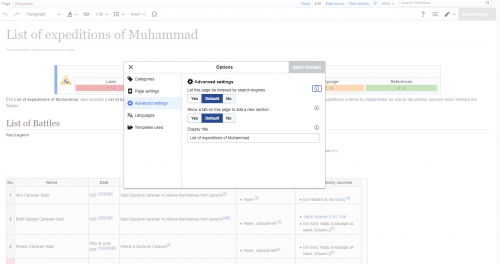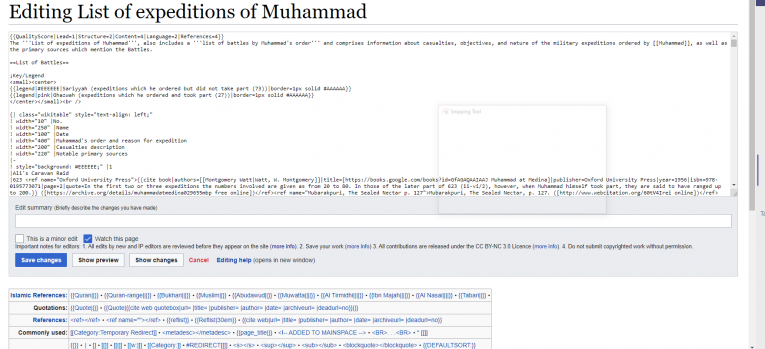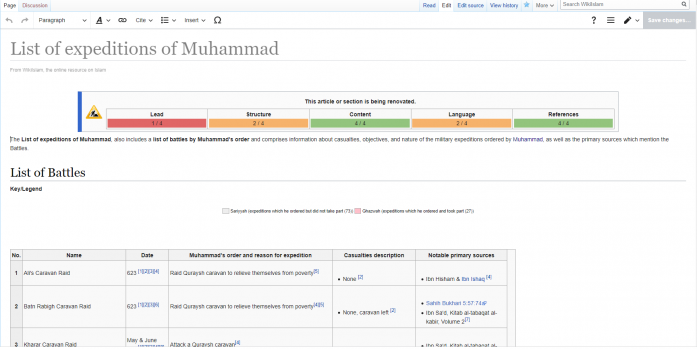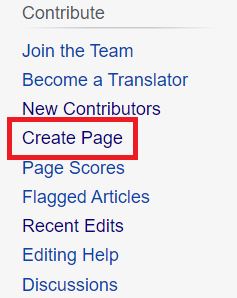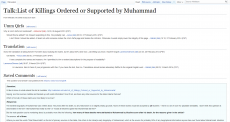WikiIslam:How to Edit: Difference between revisions
| (98 intermediate revisions by 2 users not shown) | |||
| Line 7: | Line 7: | ||
===Content style and policies=== | ===Content style and policies=== | ||
{{see also|WikiIslam:Writing Style Guide}} | {{see also|WikiIslam:Writing Style Guide}} | ||
An | An encyclopedic, neutral style with a formal tone is important: straightforward, just-the-facts, instead of essay-like, argumentative, or opinionated. The goal of a WikiIslam article is to create a comprehensive and strictly factual articles based on scholarly and primary sources about Islamic topics. All claims must be strictly backed by primary and sound, scholarly secondary sources. | ||
===Edit screen(s)=== | ===Edit screen(s)=== | ||
Editing most WikiIslam pages is simple. WikiIslam uses two interface methods: classic editing through [[ | [[File:Advanced_Settings_Screenshot.PNG|centeer|thumb|500px|Advanced settings in the visual editor]] | ||
Editing most WikiIslam pages is simple. WikiIslam uses two interface methods: classic editing through [[WikiIslam:Source Editing|source editor]] (using the wiki markup language), and a new VisualEditor (VE). The source editor is chosen by clicking the <kbd>Edit</kbd> tab at the top of a WikiIslam page. This will take you to a new page containing the editable contents of the current page. The source editor is used extensively throughout WikiIslam for such things as [[WikiIslam:Citing, Linking, and Quoting|hyperlinking, quoting, and citations]], tables and columns, special characters, and so on. | |||
The VisualEditor option is intended as a user-friendly, "What You See Is What You Get" | The VisualEditor option is intended as a user-friendly, "What You See Is What You Get" editing aid, allowing one to edit pages without the need to learn wiki markup language. See the [[WikiIslam:VisualEditor/User guide|VisualEditor user guide]] for more information. | ||
<gallery mode="packed" class="center" heights="233" style="font-size:95%" caption="Two editing environments: | <gallery mode="packed" class="center" heights="233" style="font-size:95%" caption="Two editing environments: Source editor and VisualEditor"> | ||
File: | File:Source Editor Screenshot.PNG|alt=Text in a large rectangle below two toolbars and next to a scrollbar.|Edit box showing the [[WikiIslam:Source Editing|source editor]]. You can change the formatting and contents of the page by changing what is written in this box. | ||
File: | File:VisualEditor Screenshot.PNG|Screenshot showing the same article in [[Wikipedia:VisualEditor|VisualEditor]]. Unlike the source editor display, VisualEditor will show the text being edited almost as if it were already published. | ||
</gallery> | </gallery> | ||
===Linking to Other Articles on WikiIslam=== | |||
[[ | Within the text of articles, you can provide hyperlinks, highlighted in blue text, to other articles on WikiIslam, for example [[Textual History of the Qur'an]]. This can be done both in the visual editor and in the source editor. In the visual editor, simply type in [[ and the editor will prompt you to choose the article you desire via a search. In the source editor, the exact name of the article must be put into double brackets, like so: <nowiki>[[Textual History of the Qur'an]]</nowiki>. If you wish to use another piece of text besides the name of the article as the link, [[Textual History of the Qur'an|like so]], you can use the pipe in the source editor. To produce the previous example, the markup language looks like this: <nowiki>[[Textual History of the Qur'an|like so]]</nowiki>. | ||
===Adding references=== | |||
Generally, sources are added directly after the facts they support at the end of the sentence and after any punctuation. WikiIslam permits editors to use any citation system that allows the reader to understand where the information came from, and strongly encourages use of inline citations to do so. For more on citations, see [[WikiIslam:Citing, Linking, and Quoting]]. Common methods of placing inline citations include footnotes, shortened footnotes and parenthetical references. | |||
Inline citations are most commonly placed by inserting a reference between <code><nowiki><ref></nowiki></code> ... <code><nowiki></ref></nowiki></code> tags, directly in the text of an article. The reference is a footnote, appearing as an inline link (e.g. <small><sup><span style="color:#002BB8">[1][2]</span></sup></small>) to a particular item in a collated, numbered list of footnotes, found wherever a {{tl|reflist}} template or <code><nowiki><references /></nowiki></code> tag is present, usually in a section titled "References" or "Notes". When you add references to an article, this section will automatically be created. | |||
There are a number of tools available to help with citation placement and formatting, some of which are internal tools and scripts, while others are available from external sites. For an example of the former, RefToolbar is a JavaScript toolbar displayed above the edit box that provides the ability to automatically fill out various [[WikiIslam:Citation templates|citation templates]] and insert them in the text already formatted inside <code><nowiki><ref></nowiki></code> ... <code><nowiki></ref></nowiki></code> tags. For an example of the latter, the [https://alyw234237.github.io/wiki-doi-gbooks-citation-maker/ Wikipedia DOI and Google Books Citation Maker] converts a digital object identifier (DOI) or Google Books address (URL) into a filled-out {{tl|cite journal}} or {{tl|cite book}} template ready to be pasted into an article. See [[https://en.wikipedia.org/wiki/Help:Citation_tools Help:Citation tools]] on Wikipedia for many others. | |||
There are a number of tools available to help with citation placement and formatting, some of which are internal tools and scripts, while others are available from external sites. For an example of the former, | |||
===Adding images, sounds, and videos=== | ===Adding images, sounds, and videos=== | ||
A file that is already hosted on WikiIslam can be inserted with the basic code <code><nowiki>[[File:FILENAME|thumb|DESCRIPTION]]</nowiki></code>. (<code>Image:</code> can be substituted for <code>File:</code> with no change in effect; the choice between the two is purely a matter of editorial preference.) Using <code>thumb</code> generates a thumbnail of an image (the most common placement option), which is typically sized differently from the original image. Files can be submitted through the upload file link on the right. If you do not have permission to do this, please contact administrator [[User:Asmith]]. | |||
A file that is already hosted on WikiIslam | |||
== | ===Templates=== | ||
In order to format and organize data, templates are used on WikiIslam. These are markup language commands which tell the wiki to format data in specific ways and links to outside websites. Commonly used templates on WikiIslam include the quote template, the Quran template, the Quran series template, and the various hadith templates. Quote can be used in the following manner: <code><nowiki>{{Quote</nowiki></code> ... <code><nowiki>}}</nowiki></code>. This will produce a box with two fields, one for a source and another for the text being quoted. The source is introduced by a pipe | after the word "Quote." See the example below: | |||
{{Quote|Sample Source| Sample Text}} | |||
These quote boxes can be used for any quoted source. Templates can also be used to link to sources outside WikiIslam, particularly the Qur'an and the hadith. WikiIslam uses www.quranx.com for this purpose. The template <code><nowiki>{{Quran|surah number|ayah number}}</nowiki></code> will produce a link to the specified surah (chapter) and ayah (verse). For example, to like to surat-al-baqarah (surah number 2), ayah 36 the template format would be <code><nowiki>{{Quran|2|36}}</nowiki></code>. For a series of ayahs the following template cane be used: <code><nowiki>{{Quran|surah number|first ayah in series|last ayah in series}}</nowiki></code>. For example for surat-al-baqarah verse 20-23 the format would be <nowiki>{{Quran|2|20|23}}</nowiki>. All of the "Sahih Six" or authoritative Sunni collections of hadith also have templates which link to QuranX. Below you can see examples of all of their uses: | |||
{{ | |||
{| border="1" cellpadding="5" cellspacing="0" style="width:700px; height:200px" | |||
!Input!!Output | |||
|- | |||
| |{{<nowiki>Bukhari|1|1|5}}</nowiki>||{{Bukhari|1|1|5}} | |||
|- | |||
| |{{<nowiki>Muslim|1|5}}</nowiki>||{{Muslim|1|5}} | |||
|- | |||
| |{{<nowiki>Abudawud|1|7}}</nowiki>||{{Abudawud|1|7}} | |||
|- | |||
| |{{<nowiki>Muwatta|1|1|5|}}</nowiki> | |||
|{{Muwatta|1|1|5|}} | |||
|- | |||
| |<nowiki>{{Al Tirmidhi|2|1|2|6}}</nowiki>||{{Al Tirmidhi|2|1|2|6}} | |||
|- | |||
| |<nowiki>{{Al Nasai|26|4|26|3257}}</nowiki>||{{Al Nasai|26|4|26|3257}} | |||
|- | |||
| |<nowiki>{{Ibn Majah|9|3|9|1903}}</nowiki>||{{Ibn Majah|9|3|9|1903}} | |||
|- | |||
|} | |||
More info on all of the Quran, Hadith, and quotation templates can be found here: [[WikiIslam:Source Editing]] | |||
A full list of all templates may be found here: [[:Category:Templates]]. | |||
== | ==Article creation== | ||
Before starting a new article, please understand [[WikiIslam:Scope and Article Relevance|WikiIslam's scope and relevance requirements]]. In short, the article should be directly related to the beliefs and/or practices of Muslims. | |||
Before creating an article, please search WikiIslam first to make sure that an article does not already exist on the subject, and please also review [[WikiIslam:Article Naming]] for guidance on how to name the article. If you want to draft an article in collaboration with others or if you want to draft an article for which you will be the only initial editor, please see [[WikiIslam:Sandbox]] for instructions. | |||
When you are ready to create the screenshot (and assuming that you have been given the rights to do so) you can click on the "create page" button under the "Contribute" panel on the right side. | |||
[[File:Creat_Page_Screenshot.JPG|center|thumb|500px|]] | |||
==Talk pages== | |||
[[File:Screenshot of Talk page.PNG|thumb|upright|thumbtime=1|A screenshot of a sample talk page]] | |||
Every article on WikiIslam has a talk page, reached by clicking the "Talk" tab just above the title (for example, [[Talk:Dhul-Qarnayn and the Alexander Romance]]). There, editors can discuss improvements to the content of an article. If you ever make a change that gets reverted by another editor, discuss the change on the talk page! Through discussion on these pages, consensus can be reached. It is very important that you conduct yourself with civility and assume good faith on the part of others. [https://en.Wikipedia.org/wiki/Wikipedia:Edit_warring Edit warring] (repeatedly overriding or reimplementing contributions) is highly discouraged. | |||
Most other pages on WikiIslam also have associated talk pages, including the user page each editor is assigned once they sign up. When other editors need to contact you, they will usually do this by leaving a message on [[Special:MyTalk|your talk page]]. When someone has left you a message that way, you will see a notice the next time you log in or view a page on WikiIslam. You can sign your contributions to a Talk page by using four tildes (<nowiki>~~~~</nowiki>), which produces your username and a time/date stamp. | |||
==See also== | |||
*[[ | *[[WikiIslam:Source Editing]] | ||
*[[ | *[[WikiIslam:Scope and Article Relevance]] | ||
*[[ | *[[WikiIslam:Writing Style Guide]] | ||
*[[WikiIslam:Citing, Linking, and Quoting]] | |||
*[[WikiIslam:Structure]] | |||
---- | ---- | ||
[[Category:Help Pages]] | |||
[[Category:Policies and Guidelines]] | |||
[[Category: | |||
[[Category: | |||
Latest revision as of 02:00, 14 March 2024
WikiIslam is a wiki, meaning it is made for anyone to edit, although currently editing is locked down and only accessible to registered users. There are two editing interfaces: the new Visual Editor (VE) and classic wiki source editing (using the wiki markup language).
Editing articles
Content style and policies
See also: WikiIslam:Writing Style Guide
An encyclopedic, neutral style with a formal tone is important: straightforward, just-the-facts, instead of essay-like, argumentative, or opinionated. The goal of a WikiIslam article is to create a comprehensive and strictly factual articles based on scholarly and primary sources about Islamic topics. All claims must be strictly backed by primary and sound, scholarly secondary sources.
Edit screen(s)
Editing most WikiIslam pages is simple. WikiIslam uses two interface methods: classic editing through source editor (using the wiki markup language), and a new VisualEditor (VE). The source editor is chosen by clicking the Edit tab at the top of a WikiIslam page. This will take you to a new page containing the editable contents of the current page. The source editor is used extensively throughout WikiIslam for such things as hyperlinking, quoting, and citations, tables and columns, special characters, and so on.
The VisualEditor option is intended as a user-friendly, "What You See Is What You Get" editing aid, allowing one to edit pages without the need to learn wiki markup language. See the VisualEditor user guide for more information.
- Two editing environments: Source editor and VisualEditor
Edit box showing the source editor. You can change the formatting and contents of the page by changing what is written in this box.
Screenshot showing the same article in VisualEditor. Unlike the source editor display, VisualEditor will show the text being edited almost as if it were already published.
Linking to Other Articles on WikiIslam
Within the text of articles, you can provide hyperlinks, highlighted in blue text, to other articles on WikiIslam, for example Textual History of the Qur'an. This can be done both in the visual editor and in the source editor. In the visual editor, simply type in [[ and the editor will prompt you to choose the article you desire via a search. In the source editor, the exact name of the article must be put into double brackets, like so: [[Textual History of the Qur'an]]. If you wish to use another piece of text besides the name of the article as the link, like so, you can use the pipe in the source editor. To produce the previous example, the markup language looks like this: [[Textual History of the Qur'an|like so]].
Adding references
Generally, sources are added directly after the facts they support at the end of the sentence and after any punctuation. WikiIslam permits editors to use any citation system that allows the reader to understand where the information came from, and strongly encourages use of inline citations to do so. For more on citations, see WikiIslam:Citing, Linking, and Quoting. Common methods of placing inline citations include footnotes, shortened footnotes and parenthetical references.
Inline citations are most commonly placed by inserting a reference between <ref> ... </ref> tags, directly in the text of an article. The reference is a footnote, appearing as an inline link (e.g. [1][2]) to a particular item in a collated, numbered list of footnotes, found wherever a {{reflist}} template or <references /> tag is present, usually in a section titled "References" or "Notes". When you add references to an article, this section will automatically be created.
There are a number of tools available to help with citation placement and formatting, some of which are internal tools and scripts, while others are available from external sites. For an example of the former, RefToolbar is a JavaScript toolbar displayed above the edit box that provides the ability to automatically fill out various citation templates and insert them in the text already formatted inside <ref> ... </ref> tags. For an example of the latter, the Wikipedia DOI and Google Books Citation Maker converts a digital object identifier (DOI) or Google Books address (URL) into a filled-out {{cite journal}} or {{cite book}} template ready to be pasted into an article. See [Help:Citation tools] on Wikipedia for many others.
Adding images, sounds, and videos
A file that is already hosted on WikiIslam can be inserted with the basic code [[File:FILENAME|thumb|DESCRIPTION]]. (Image: can be substituted for File: with no change in effect; the choice between the two is purely a matter of editorial preference.) Using thumb generates a thumbnail of an image (the most common placement option), which is typically sized differently from the original image. Files can be submitted through the upload file link on the right. If you do not have permission to do this, please contact administrator User:Asmith.
Templates
In order to format and organize data, templates are used on WikiIslam. These are markup language commands which tell the wiki to format data in specific ways and links to outside websites. Commonly used templates on WikiIslam include the quote template, the Quran template, the Quran series template, and the various hadith templates. Quote can be used in the following manner: {{Quote ... }}. This will produce a box with two fields, one for a source and another for the text being quoted. The source is introduced by a pipe | after the word "Quote." See the example below:
These quote boxes can be used for any quoted source. Templates can also be used to link to sources outside WikiIslam, particularly the Qur'an and the hadith. WikiIslam uses www.quranx.com for this purpose. The template {{Quran|surah number|ayah number}} will produce a link to the specified surah (chapter) and ayah (verse). For example, to like to surat-al-baqarah (surah number 2), ayah 36 the template format would be {{Quran|2|36}}. For a series of ayahs the following template cane be used: {{Quran|surah number|first ayah in series|last ayah in series}}. For example for surat-al-baqarah verse 20-23 the format would be {{Quran|2|20|23}}. All of the "Sahih Six" or authoritative Sunni collections of hadith also have templates which link to QuranX. Below you can see examples of all of their uses:
| Input | Output |
|---|---|
| {{Bukhari|1|1|5}} | Sahih Bukhari 1:1:5 |
| {{Muslim|1|5}} | Sahih Muslim 1:5 |
| {{Abudawud|1|7}} | Sunan Abu Dawud 1:7 |
| {{Muwatta|1|1|5|}} | |
| {{Al Tirmidhi|2|1|2|6}} | Jami` at-Tirmidhi 1:2:6 |
| {{Al Nasai|26|4|26|3257}} | Sunan an-Nasa'i 4:26:3257 |
| {{Ibn Majah|9|3|9|1903}} | Sunan Ibn Majah 3:9:1903 |
More info on all of the Quran, Hadith, and quotation templates can be found here: WikiIslam:Source Editing
A full list of all templates may be found here: Category:Templates.
Article creation
Before starting a new article, please understand WikiIslam's scope and relevance requirements. In short, the article should be directly related to the beliefs and/or practices of Muslims.
Before creating an article, please search WikiIslam first to make sure that an article does not already exist on the subject, and please also review WikiIslam:Article Naming for guidance on how to name the article. If you want to draft an article in collaboration with others or if you want to draft an article for which you will be the only initial editor, please see WikiIslam:Sandbox for instructions.
When you are ready to create the screenshot (and assuming that you have been given the rights to do so) you can click on the "create page" button under the "Contribute" panel on the right side.
Talk pages
Every article on WikiIslam has a talk page, reached by clicking the "Talk" tab just above the title (for example, Talk:Dhul-Qarnayn and the Alexander Romance). There, editors can discuss improvements to the content of an article. If you ever make a change that gets reverted by another editor, discuss the change on the talk page! Through discussion on these pages, consensus can be reached. It is very important that you conduct yourself with civility and assume good faith on the part of others. Edit warring (repeatedly overriding or reimplementing contributions) is highly discouraged.
Most other pages on WikiIslam also have associated talk pages, including the user page each editor is assigned once they sign up. When other editors need to contact you, they will usually do this by leaving a message on your talk page. When someone has left you a message that way, you will see a notice the next time you log in or view a page on WikiIslam. You can sign your contributions to a Talk page by using four tildes (~~~~), which produces your username and a time/date stamp.
See also
- WikiIslam:Source Editing
- WikiIslam:Scope and Article Relevance
- WikiIslam:Writing Style Guide
- WikiIslam:Citing, Linking, and Quoting
- WikiIslam:Structure
